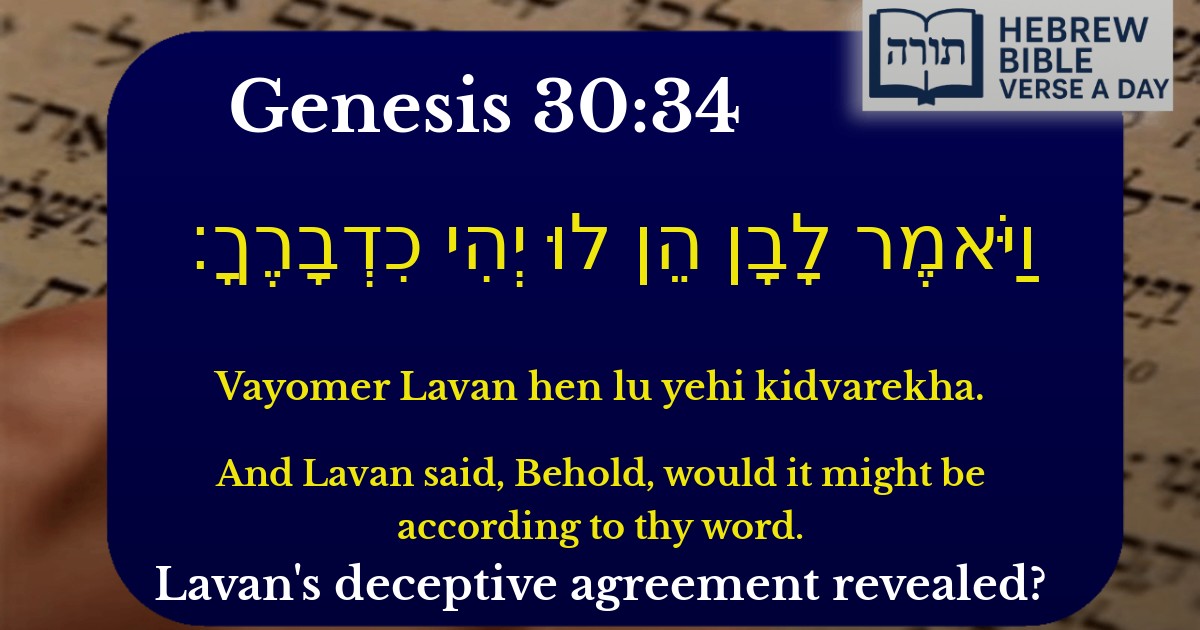Join Our Newsletter To Be Informed When New Videos Are Posted
Join the thousands of fellow Studends who rely on our videos to learn how to read the bible in Hebrew for free!
Hebrew Text
וַיֹּאמֶר לָבָן הֵן לוּ יְהִי כִדְבָרֶךָ׃
English Translation
And Lavan said, Behold, would it might be according to thy word.
Transliteration
Vayomer Lavan hen lu yehi kidvarekha.
Hebrew Leining Text
וַיֹּ֥אמֶר לָבָ֖ן הֵ֑ן ל֖וּ יְהִ֥י כִדְבָרֶֽךָ׃
וַיֹּ֥אמֶר לָבָ֖ן הֵ֑ן ל֖וּ יְהִ֥י כִדְבָרֶֽךָ׃
🎵 Listen to leining
Parasha Commentary
📚 Talmud Citations
This verse is not quoted in the Talmud.


Context of the Verse
The verse (Genesis 30:34) appears in the narrative of Yaakov's negotiations with Lavan regarding the division of livestock. Lavan agrees to Yaakov's proposal that the speckled and spotted sheep and goats, as well as the dark-colored lambs, would belong to Yaakov as his wages.
Lavan's Response: A Superficial Agreement
Rashi explains that Lavan's words, "הֵן לוּ יְהִי כִדְבָרֶךָ" ("Behold, would it might be according to thy word"), indicate a reluctant and insincere agreement. The term "לוּ" (would that) is often used in Tanach to express a wish that is unlikely to be fulfilled (see Rashi on Genesis 17:18). Lavan appears to consent, but his tone suggests he does not truly expect Yaakov's plan to succeed.
Lavan's Cunning Nature
Midrashic sources (e.g., Bereishit Rabbah 73:10) highlight Lavan's deceitful character. His response reflects his underlying intent to manipulate the situation. The Midrash compares Lavan to a snake that pretends to listen but is planning to strike. Despite his outward agreement, Lavan later attempts to change the terms repeatedly (Genesis 31:7), demonstrating his untrustworthiness.
Yaakov's Wisdom in the Agreement
Ramban (Nachmanides) notes that Yaakov's proposal was Divinely inspired, as later evidenced by the miraculous growth of the speckled and spotted flocks (Genesis 31:10-12). Lavan's reluctant agreement unwittingly set the stage for Yaakov's eventual prosperity, fulfilling Hashem's promise to Yaakov (Genesis 28:13-15).
Linguistic Nuances
Moral Lesson
The Sforno teaches that this episode illustrates the principle that those who scheme against the righteous ultimately fail, as "the counsel of Hashem alone shall stand" (Proverbs 19:21). Lavan's insincerity contrasts with Yaakov's integrity, showing that honesty and trust in Hashem prevail.